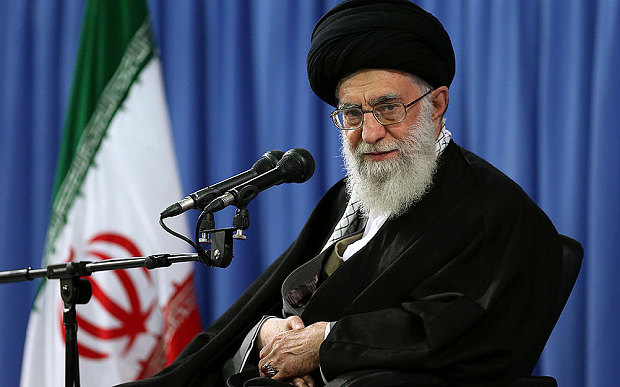
Diplomats issue warning amid concerns over health of Ayatollah Ali Khamenei, who would need to ratify any deal
www.telegraph.co.uk
By Con Coughlin, Defence Editor
There are mounting fears that a deepening power struggle in Tehran over the succession for the powerful position of Supreme Leader could derail attempts to negotiate a deal over Iran’s nuclear programme.
Western diplomats involved in the negotiations believe the increasingly frail health of Ayatollah Ali Khamenei, the regime’s current Supreme Leader, has prompted a fierce power struggle between rival contenders as they jostle for the succession.
Concerns have grown over the health of Mr Khamenei, the country’s leading hardliner, after the 75-year-old underwent a series of operation for prostate cancer.
Recent reports in the Iranian media have suggested that his condition is terminal, and that the man who had dominated Iranian politics since the death of Ayatollah Ruhollah Khomeini, the revolution’s founding father, in 1989 only has months to live.
In March Ayatollah Mohammed Yazdi, 84, a hardline ally of Mr Khamenei, was elected head of the Assembly of Experts, the religious body responsible for choosing the country’s new Supreme Leader when the position falls vacant.
Western diplomats say that one of Mr Khamenei’s protégés, Sadeq Larijani, the head of Iran’s judicial system and a noted hardliner, is positioning himself to be appointed the new Supreme Leader when the Assembly of Experts comes to make its decision.
Mr Larijani, 54, is the brother of Ali Larijani, Iran’s former chief nuclear negotiator who is now chairman of the Majlis, the Iranian parliament.
He is now reported to be conducting a purge against more moderate ayatollahs who might put their names forward to become the country’s new Supreme Leader.
For example, Mr Larijani has recently launched a judicial inquiry into allegations of corruption made against the moderate ayatollah, Mahmoud Hashemi Shahroudi, who is a leading ally of Iran’s former moderate president, Ali Akbar Hashemi Rafsanjani.
By launching the inquiry, diplomats believe Mr Larijani has effectively ended Mr Shahroudi’s chances of standing for election.
The renewed bout of political in-fighting in Tehran is causing particular concern for Western diplomats involved in negotiations to resolve the stand-off over Iran’s nuclear programme.
June 30 has been set as the date for a final agreement to be reached, whereby Iran agrees to scale down the elements of its programme that could be used to develop nuclear weapons in return for the easing of crippling economic sanctions.
After years of negotiations, U.S. officials believe a deal is within reach that for a decade would keep Iran at least a year from being able to build a nuclear weapon.
But any final agreement negotiated between Iran and representatives of the so-called P5+1 – the five permanent members of the U.N. Security Council and Iran – needs to be ratified by the Supreme Leader.
In the past attempts to achieve a breakthrough in the long-running dispute have failed because Mr Khamenei and other hardliners in Iran’s Revolutionary Guards have refused to accept any deal negotiated with the U.S..
Now Western negotiators fear the current round of negotiations could suffer a similar fate as a result of the political in-fighting taking place in Tehran.
“With so many people jockeying for position, the hardliners will be tempted to prove their revolutionary credentials by vetoing any deal with the U.S.,” explained a senior Western diplomat.
“The fear now is that this could jeopardise any progress we make in resolving the issue and lifting the sanctions.”












 Posted in
Posted in 











